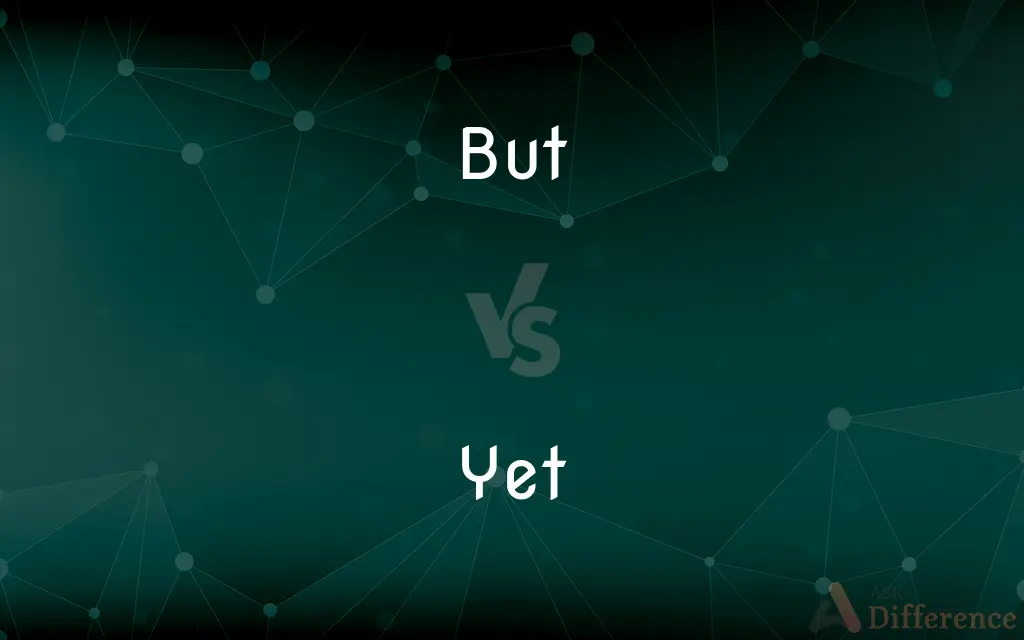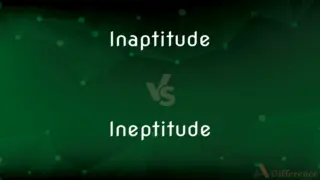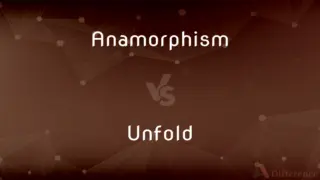But vs. Yet — What's the Difference?
By Tayyaba Rehman — Updated on October 13, 2023
"But" is a conjunction used to introduce a contrast, while "yet" also introduces a contrast and can indicate a time up to now.

Difference Between But and Yet
Table of Contents
ADVERTISEMENT
Key Differences
"But" and "yet" are both conjunctions in the English language, often used to introduce contrasting information. "But" is more straightforward in its function, primarily serving to introduce an opposition or contradiction. For instance, "I love ice cream, but I shouldn't eat it before dinner."
On the other hand, "yet" can introduce a contrast much like "but," and it carries a nuance of time or unexpectedness. When used in the context of time, "yet" refers to something that hasn't happened up to the present moment. For example, "I haven't finished my work yet."
In terms of positioning, "but" is usually sandwiched between two contrasting clauses. It directly contrasts what was previously stated. "Yet," while sometimes used similarly to "but," can also appear at the end of a sentence, especially when indicating time. "Have you had dinner yet?"
Another distinction between "but" and "yet" is their frequency of use in different contexts. "But" is more commonly used and versatile, suitable for both formal and informal contexts. "Yet" can sound slightly more formal when used as a contrasting conjunction, though its time-related use is neutral.
Comparison Chart
Primary Function
Introduce a contrast
Introduce a contrast or indicate time
ADVERTISEMENT
Example of Use
"She is young but wise."
"She hasn’t visited Europe yet."
Positioning
Typically between two contrasting clauses
Between clauses or at the end of a sentence
Formality
Neutral
Slightly more formal when used as a contrast
Nuance
Direct contrast
Contrast with an element of unexpectedness or time
Compare with Definitions
But
But (Conjunction introducing contrast)
He's quiet, but very intelligent.
Yet
Yet (Conjunction indicating contrast)
It's simple, yet incredibly effective.
But
But (Adverb emphasizing degree)
I am but a humble servant.
Yet
Up until the present or a specified or implied time; by now or then
I haven't told anyone else yet
Aren't you ready to go yet?
I have yet to be convinced
The congress was widely acclaimed as the best yet
But
But (Noun meaning objection)
The main but to this approach is its cost.
Yet
Still; even (used to emphasize increase or repetition)
Snow, snow, and yet more snow
Yet another diet book
The rations were reduced yet again
But
But (Used to introduce a response)
I understand your concerns, but we must proceed.
Yet
In spite of that; nevertheless
Every week she gets worse, and yet it could go on for years
But
On the contrary
The plan caused not prosperity but ruin.
Yet
But at the same time; but nevertheless
The path was dark, yet I slowly found my way
But
Contrary to expectation; yet
She organized her work but accomplished very little. He is tired but happy.
Yet
At this time; for the present
Isn't ready yet.
But
Usage Problem Used to indicate an exception
No one but she saw the prowler.
Yet
Up to a specified time; thus far
The end had not yet come.
But
With the exception that; except that. Often used with that
Would have joined the band but he couldn't spare the time.
Would have resisted but that they lacked courage.
Yet
At a future time; eventually
May yet change his mind.
But
(Informal) Without the result that
It never rains but it pours.
Yet
Besides; in addition
Returned for yet another helping.
But
(Informal) That. Often used after a negative
There is no doubt but right will prevail.
Yet
Still more; even
A yet sadder tale.
But
That ... not. Used after a negative or question
There never is a tax law presented but someone will oppose it.
Yet
Nevertheless
Young yet wise.
But
(Informal) Than
They had no sooner arrived but they turned around and left.
Yet
And despite this; nevertheless
She said she would be late, yet she arrived on time.
But
Usage Problem Except.
Yet
Thus far; up to the present; up to some unspecified time.
But
Merely; just; only
Hopes that lasted but a moment.
Yet
In negative or interrogative use, often with an expectation or potential of something happening in the future.
I haven't finished yet.
Have you finished yet?
We do not yet know what happened.
He has never yet been late for an appointment.
But
Used as an intensive
Get out of here but fast!.
Yet
In negative imperative use, asking for an action to be delayed.
Don't switch it on yet – wait until I've reconnected the pump.
But
A concern or objection
My offer is final, no ifs, ands, or buts.
Yet
In affirmative use: still.
He is yet breathing. (He is still breathing.)
But
Apart from, except (for), excluding.
Everyone but Father left early.
I like everything but that.
Nobody answered the door when I knocked, so I had no choice but to leave.
Yet
At some future time; eventually.
The riddle will be solved yet.
But
Outside of.
Away but the hoose and tell me whae's there.
Yet
Not as of the time referenced.
I’ve yet to see him. — I have not yet seen him.
I had yet to go to a convention. — I had not yet gone to a convention.
They are yet to win a single match. — They have not yet won a single match.
He seemed yet to be convinced. — He seemed not yet to have been convinced.
But
Merely, only, just, no more than
Christmas comes but once a year.
Yet
In addition.
There are two hours yet to go until our destination.
But
Though, however.
I'll have to go home early but.
Yet
(degree) Even.
K-2 is yet higher than this.
Oh no! Yet more problems!
But
, although, nevertheless, on the other hand introducing a clause contrary to prior belief or in contrast with the preceding clause or sentence.
She is very old but still attractive.
You told me I could do that, but she said that I could not.
Yet
Nevertheless; however; but; despite that.
I thought I knew you, yet how wrong I was.
But
, rather adversative conjunction, introducing a word or clause in contrast or contradiction with the preceding negative clause or sentence}}.
I am not rich but [I am] poor.
Not John but Peter went there.
Yet
(obsolete) To pour.
But
(colloquial) Used at the beginning of a sentence to express opposition to a remark.
But I never said you could do that!
Yet
To melt; found; cast (e.g. metal, by pouring it into a mould when molten).
But
Except that (introducing a subordinate clause which qualifies a negative statement); also, with omission of the subject of the subordinate clause, acting as a negative relative, "except one that", "except such that".
I cannot but feel offended.
Yet
To get.
But
(colloquial) Used to link an interjection to the following remark as an intensifier.
Wow! But that's amazing!
Yet
(dialectal) A metal pan or boiler; yetling.
But
(archaic) Without it also being the case that; unless that (introducing a necessary concomitant).
It never rains but it pours.
Yet
Any one of several species of large marine gastropods belonging to the genus Yetus, or Cymba; a boat shell.
But
(obsolete) Except with; unless with; without.
Yet
In addition; further; besides; over and above; still.
This furnishes us with yet one more reason why our savior, lays such a particular stress acts of mercy.
The rapine is made yet blacker by the pretense of piety and justice.
But
(obsolete) Only; solely; merely.
Yet
At the same time; by continuance from a former state; still.
Facts they had heard while they were yet heathens.
But
(obsolete) Until.
Yet
Before some future time; before the end; eventually; in time.
But
That.
Yet
Even; - used emphatically.
Men may not too rashly believe the confessions of witches, nor yet the evidence against them.
But
An instance or example of using the word "but".
It has to be done – no ifs or buts.
Yet
Nevertheless; notwithstanding; however.
Yet I say unto you, That even Solomon in all his glory was not arrayed like one of these.
But
(Scotland) The outer room of a small two-room cottage.
Yet
Up to the present time;
I have yet to see the results
Details are yet to be worked out
But
A limit; a boundary.
Yet
Used in negative statement to describe a situation that has existed up to this point or up to the present time;
So far he hasn't called
The sun isn't up yet
But
The end; especially the larger or thicker end, or the blunt, in distinction from the sharp, end; the butt.
Yet
To a greater degree or extent; used with comparisons;
Looked sick and felt even worse
An even (or still) more interesting problem
Still another problem must be solved
A yet sadder tale
But
(archaic) Use the word "but".
But me no buts.
Yet
Within an indefinite time or at an unspecified future time;
He will understand eventually
He longed for the flowers that were yet to show themselves
Sooner or later you will have to face the facts
In time they came to accept the harsh reality
But
Except with; unless with; without.
So insolent that he could not go but either spurning equals or trampling on his inferiors.
Touch not the cat but a glove.
Yet
Used after a superlative;
This is the best so far
The largest drug bust yet
But
Except; besides; save.
Who can it be, ye gods! but perjured Lycon?
Yet
Despite anything to the contrary (usually following a concession);
Although I'm a little afraid, however I'd like to try it
While we disliked each other, nevertheless we agreed
He was a stern yet fair master
Granted that it is dangerous, all the same I still want to go
But
Excepting or excluding the fact that; save that; were it not that; unless; - elliptical, for but that.
And but my noble Moor is true of mind . . . it were enough to put him to ill thinking.
Yet
Yet (Adverb referring to time)
I haven't seen him yet.
But
Otherwise than that; that not; - commonly, after a negative, with that.
It cannot be but nature hath some director, of infinite power, to guide her in all her ways.
There is no question but the king of Spain will reform most of the abuses.
Yet
Yet (Used to introduce a further point)
She's talented, and yet chooses to stay humble.
But
Only; solely; merely.
Observe but how their own principles combat one another.
If they kill us, we shall but die.
A formidable man but to his friends.
Yet
Yet (Emphasizing a comparative)
The task seemed yet more daunting.
But
On the contrary; on the other hand; only; yet; still; however; nevertheless; more; further; - as connective of sentences or clauses of a sentence, in a sense more or less exceptive or adversative; as, the House of Representatives passed the bill, but the Senate dissented; our wants are many, but quite of another kind.
Now abideth faith hope, charity, these three; but the greatest of these is charity.
When pride cometh, then cometh shame; but with the lowly is wisdom.
But and if that servant say in his heart, My lord delayeth his coming; . . . the lord of that servant will come in a day when he looketh not for him.
But this I read, that but if remedyThou her afford, full shortly I her dead shall see.
Yet
Yet (Introducing a conclusion)
It's costly, yet it's worth it.
But
The outer apartment or kitchen of a two-roomed house; - opposed to ben, the inner room.
But
A limit; a boundary.
But
The end; esp. the larger or thicker end, or the blunt, in distinction from the sharp, end. Now disused in this sense, being replaced by butt{2}. See 1st Butt.
But
And nothing more;
I was merely asking
It is simply a matter of time
Just a scratch
He was only a child
Hopes that last but a moment
But
But (Preposition indicating exception)
Everyone but Jane knew the answer.
Common Curiosities
Can "yet" be used at the end of a sentence?
Yes, especially when referring to time, e.g., "Have you eaten yet?"
Can "but" also be a preposition?
Yes, as in "Everyone but me knew."
Which is more common in everyday speech?
"But" is more commonly used than "yet."
Do both words introduce opposition?
Yes, both can introduce contrasting information.
Can "but" and "yet" always be used interchangeably?
No, while both introduce contrast, "yet" can also indicate time.
Which is more formal when contrasting?
"Yet" can sound slightly more formal than "but" in contrast.
Can "yet" emphasize comparatives?
Yes, as in "The mountain seemed yet taller."
Which conjunction often indicates unexpectedness?
"Yet" often introduces a contrast with an element of unexpectedness.
Is "but" ever used as a noun?
Yes, referring to an objection, e.g., "There are several buts to consider."
How are "but" and "yet" used differently in time-related contexts?
"But" doesn't have a time function, while "yet" can indicate something hasn't happened until now.
Is "but" always sandwiched between two clauses?
Typically, yes. E.g., "She is tall but strong."
Can "but" indicate an exception?
Yes, when used as a preposition, e.g., "All but one passed."
Can "yet" begin a sentence?
Yes, especially when introducing a further point or conclusion.
How does "yet" emphasize a point?
By introducing a further point or emphasizing a comparative.
Can "but" introduce a response to a statement?
Yes, e.g., "I hear you, but we need to move on."
Share Your Discovery

Previous Comparison
Inaptitude vs. Ineptitude
Next Comparison
Anamorphism vs. UnfoldAuthor Spotlight
Written by
Tayyaba RehmanTayyaba Rehman is a distinguished writer, currently serving as a primary contributor to askdifference.com. As a researcher in semantics and etymology, Tayyaba's passion for the complexity of languages and their distinctions has found a perfect home on the platform. Tayyaba delves into the intricacies of language, distinguishing between commonly confused words and phrases, thereby providing clarity for readers worldwide.















































